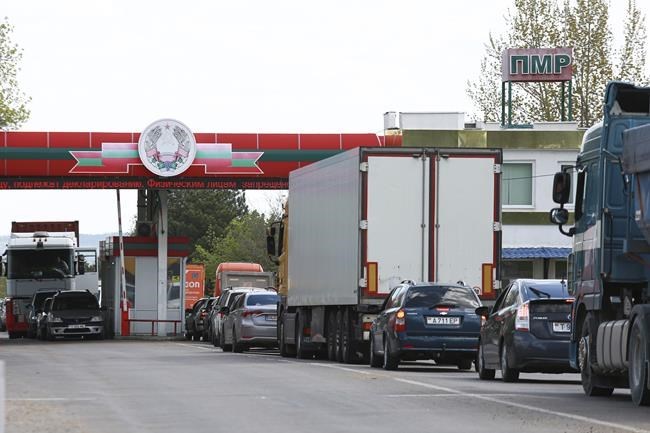BUCHAREST, Romania (AP) — Two explosions in a radio facility close to the Ukrainian border knocked a pair of powerful broadcast antennas out of service in Moldova's separatist region of Trans-Dniester, local police said Tuesday.
Trans-Dniester, a strip of land with about 470,000 people, has been under the control of separatist authorities since a 1992 war with Moldova. Russia bases about 1,500 troops in the breakaway region, nominally as peacekeepers.
Ukrainian officials have expressed concern about Moscow using those forces to invade Ukraine, while the threat of renewed fighting over Trans-Dniester worries Moldovan authorities. The fear is that Russia will claim it needs to intervene to protect its troops or restore order.
The explosions happened in the small town of Maiac, roughly 12 kilometers (7 miles) west of the Ukraine border, according to the region’s Interior Ministry. No one was hurt, officials said.
The two antennas were used for broadcasting Russian radio shows. No one has claimed responsibility for the blasts.
The United States has warned amid the war in Ukraine that Russia could launch “false-flag” attacks in nearby nations as a pretext for sending in troops.
On Monday, several explosions, believed to have been caused by rocket-propelled grenades, were reported to have hit the Ministry of State Security in Tiraspol, Trans-Dniester’s capital.
The Security Council of Trans-Dniester reported Tuesday that there had been a total of three incidents in the region — explosions in Tiraspol on Monday, the ones in Maiac on Tuesday and damage to a military unit in the village of Parcani.
Officials did not offer any details on the military unit incident. But Trans-Dniester’s president, Vadim Krasnoselsky, called Tuesday for imposing anti-terrorist security measures at a “red level” for 15 days, including setting up checkpoints at the entrances to cities.
Kremlin spokesman Dmitry Peskov told reporters Tuesday that the situation in Trans-Dniester “elicits concern” in Moscow.
A Ukrainian presidential advisor, Mykhailo Podolyak warned in a tweet that Moldova might be attacked next,
“Bad news: if Ukraine falls tomorrow Russian troops will be at Chișinău’s gates," he tweeted, referring to Moldova's capital. "Good news: Ukraine will definitely ensure strategic security of the region. But we need to work as a team.”
Moldovan President Maia Sandu convened the country's Supreme Security Council on Tuesday to discuss the incidents. After the meeting, she said a security analysis indicated that “different forces within the region, interested in destabilizing the situation,” carried out the blasts.
The Security Council recommended ramping up border and traffic patrols, and increasing the alert level of institutions “responsible for ensuring public order and security.”
“We condemn any challenges and attempts to lure the Republic of Moldova into actions that could jeopardize peace in the country,” Sandu said. “Chisinau continues to insist on a peaceful settlement of the Transnistrian conflict.”
“We will take all necessary measures to prevent escalation, to strengthen the security of the state and to protect our citizens,” Sandu added. “We remain open to continue the dialogue for the settlement of the conflict in the region in a peaceful, diplomatically negotiated manner.”
The U.N. said Secretary-General Antonio Guterres was concerned about the reported incidents in Trans-Dniester “and urges all concerned to refrain from any statements or actions that could escalate tensions.”
U.N. deputy spokesman Farhan Haq said the United Nations continues to fully support efforts by the Organization for Security and Cooperation in Europe to reach a political settlement over the separatist region's status. The aim is to create a special status for Trans-Dniester while strengthening Moldova’s independence, sovereignty and territorial integrity.
The Associated Press


